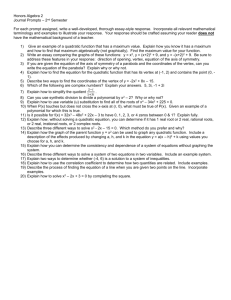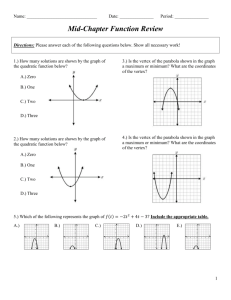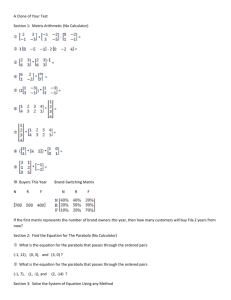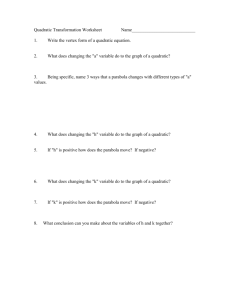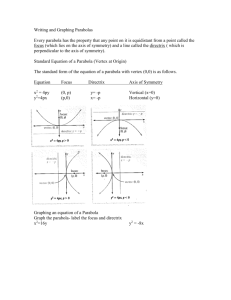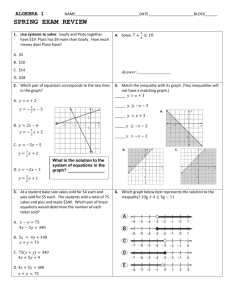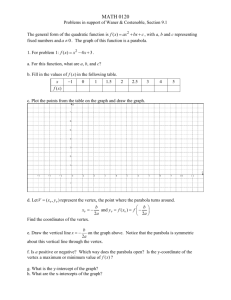Quadratic Function
advertisement
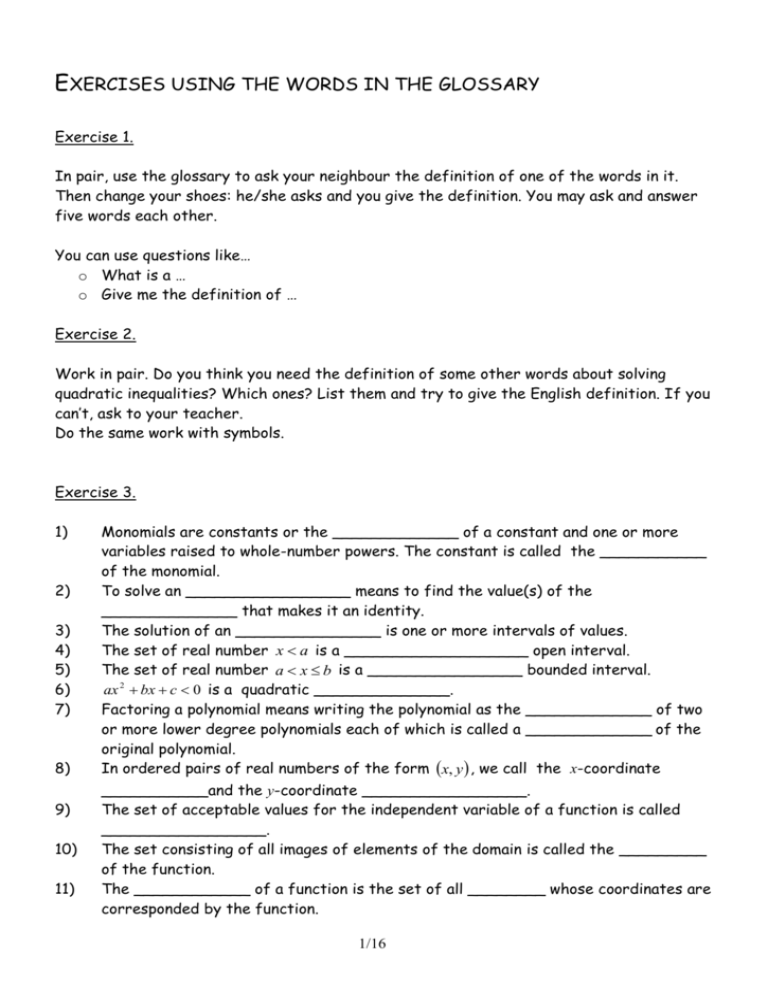
EXERCISES USING THE WORDS IN THE GLOSSARY Exercise 1. In pair, use the glossary to ask your neighbour the definition of one of the words in it. Then change your shoes: he/she asks and you give the definition. You may ask and answer five words each other. You can use questions like… o What is a … o Give me the definition of … Exercise 2. Work in pair. Do you think you need the definition of some other words about solving quadratic inequalities? Which ones? List them and try to give the English definition. If you can’t, ask to your teacher. Do the same work with symbols. Exercise 3. 1) 2) 3) 4) 5) 6) 7) 8) 9) 10) 11) Monomials are constants or the _____________ of a constant and one or more variables raised to whole-number powers. The constant is called the ___________ of the monomial. To solve an _________________ means to find the value(s) of the ______________ that makes it an identity. The solution of an _______________ is one or more intervals of values. The set of real number x a is a ___________________ open interval. The set of real number a x b is a ________________ bounded interval. ax 2 bx c 0 is a quadratic ______________. Factoring a polynomial means writing the polynomial as the _____________ of two or more lower degree polynomials each of which is called a _____________ of the original polynomial. In ordered pairs of real numbers of the form x, y , we call the x-coordinate ___________and the y-coordinate _________________. The set of acceptable values for the independent variable of a function is called _________________. The set consisting of all images of elements of the domain is called the _________ of the function. The ____________ of a function is the set of all ________ whose coordinates are corresponded by the function. 1/16 Exercise 3bis Complete in pairs the following questions with the mathematical words you have learned during the lesson: 1) A______________________of__________numbers of the form (x,y) represents the __________________of points in the plan. X is called__________________, y is called___________________. 2) The axes of a Cartesian _____________________________ are ________________________ each other and intersect in the ____________. 3) A monomial is the __________________of a number and one or more ________________with positive____________________. 4) A _____________ is the sum of one or more monomial. 5)The _______________form of a polynomial in one ________________is when the powers of the variables _______________in value when the terms are read from ____________to_________________. 6)___________________a polynomial means to write it with the product of one or more _____________degree polynomials. 7)A _________________ is a ____________which describes how one or more variables are related to each other. 8) The _______________is the set of ____________numbers that are possible to assign to the x value. 9) The values of y ______________________to the x values is called _______________of the function. 10) The ____________of a function is drowned in a ________________________________system, linking with a line all points (x,y) 11) y=2x-5 is a ________________function of ___________degree. 12) y=4x2-7x+2 is a __________________function of second degree. 13) 4x2-y2 is the difference of two __________________ 14) 4x2-32x+64 is the ______________________of the following binomial ____________________ 15) 9x3-27 is factored like the _______________of_________________________ 16)factoring ____________________is (x-5)(x+3) 2/16 Homework (dopo glossary) How do you call the set in which variables change? (domain) Is it necessary to assign the domain of a variable? How many variables make an equation of first degree true ? What does it mean to solve an equation? What is the characteristic symbol to write an equation? Is this an equation or an identity? x 12 x 2 2 x 1 Why? (because the equality is true for every values of x ) What are the solutions of this equations? x 5 x 6 0 2 Can you find real values which make this equality true ? x 12 5 What can you say in this case? (The equality is impossible) Can you write on the blackboard an inequality of first degree? ( 3x 5 0 ) What are the solutions? x 5 ; 3 How many are there?; What are the symbols used to write an inequality? Define a Cartesian coordinate system What is a monomial? What is a polynomial? What is the standard form of the polynomial ? 3/16 Is the solutions like an interval? QUADRATIC INEQUALITIES In these lessons we want to explain how to solve a quadratic inequality using the graph of a parabola (quadratic function). Our work is going to be done in two steps: 1. we are going to learn how to sketch the graph of a parabola 2. we are going to study the sign of a quadratic polynomial using parabolas Quadratic Function The basic quadratic function is the function y x 2 . If we form a table of values we find x 0 1 -1 2 -2 3 -3 4 -4 y 0 1 1 4 4 9 9 16 16 Now we can plot the points and connect them and we find the graph of a parabola. -5 -4 -3 -2 16 14 12 10 8 6 4 2 0 -1 0 1 2 3 4 5 For each value of independent variable x, the image y x 2 is a positive number (or zero if x 0 ). We can see graphically the solutions of every inequality involving only x 2 and we can follow this table: inequality solutions x2 0 x R 2 x 0 x0 2 x 0 2 x 0 x0 4/16 Functions y ax 2 are parabolas too. Their graph, for positive a, is the same of the basic function y x 2 stretched by a factor of a (if a 1 ) or compressed by a factor of 1 / a (if 0 a 1 ). All of them are parabolas opening up. -5 -4 -3 -2 16 14 12 10 8 6 4 2 0 -1 0 inequality solutions ax 2 0 x R 2 ax 0 x0 a0 2 ax 0 2 ax 0 x0 a=2 a=1/2 1 2 3 4 5 If a is negative, parabolas will be opening down. 2 -5 -4 -3 -2 0 -1 -2 0 1 2 3 4 inequality ax 2 0 ax 2 0 a0 ax 2 0 ax 2 0 5 -4 a=-1 -6 a=-2 -8 a=-1/2 -10 -12 solutions x0 x0 x R -14 -16 All of them have a symmetry axis: y-axis is it; and they have the point O as their vertex. We can observe that if k is a constant and g x f x k , then the graph of g x is the graph of f x shifted vertically k units. The graph of f x is shifted up if k 0 , and is shifted down if k 0 . Functions y ax 2 k are parabolas 16 shifted vertically . In these cases y-axis is symmetry axis yet, but the vertex is the point P 0, k 14 12 10 8 y=x^2 6 4 y=(x^2)-2 y(x^2)+2 2 -5 -4 -3 5/16 -2 0 -1-2 0 -4 1 2 3 4 5 We can also see that if h is a constant and g x f x h , then the graph of g x is the graph of f x shifted horizontally h units. The graph of f x is shifted to the right if h 0 , and is shifted to the left if h 0 . Functions y ax h are parabolas 2 16 shifted horizontally. In these cases the symmetry axis is the line x h , and the vertex is the point P h,0 14 12 y=3(x^2) 10 8 y="3(x-2)^2" 6 y="3(x+2)^2" 4 2 0 -5 -4 -3 -2 -1 0 1 2 3 4 5 what happens to the symmetry axis? does it shift to the rigtht or to the left? Every time we have a quadratic function y ax 2 bx c we can always write it in the form y ax h k : 2 b c b b2 y ax 2 bx c a x 2 x a x 2 x 2 a a a 4a 2 b2 c b 4ac b 2 2 a x a 2a 4a 4a and so we can easily say that every quadratic function is a parabola, o opening up if a 0 or opening down if a 0 , o with line x h as symmetry axis o and V h, k as its vertex, where h b b 2 4ac and k 2a 4a 4a y ax 2 bx c To find where a parabola intercepts x-axis we need to solve the system ; y 0 so the solutions of the quadratic equation are the values we are looking for. In the same way we can find where a parabola intercepts y-axis solving the system y ax 2 bx c . x 0 6/16 Let’s do some examples: 1) y x 2 5x 6 is a parabola opening up, with x 5 as symmetry axis and the point 2 5 1 V , as its vertex. The parabola intercepts x-axis at the points A2, 0 , B3, 0 2 4 and y-axis at the point C0, 6 . 8 7 6 5 4 3 2 1 -5 -4 -3 0 -1 -1 0 -2 1 2 3 4 5 -2 2) y x 2 2 x 8 is a parabola opening down, with x 1 as symmetry axis and the point V 1, 9 as its vertex. The parabola intercepts x-axis at the points A 4, 0 , B2, 0 and y-axis at the point C 0, 8. 10 8 6 4 2 -5 -4 -3 -2 0 -1 -2 0 -4 -6 -8 -10 7/16 1 2 3 4 5 Exercise 1. 10 0 -5 -4 -3 -2 -1 -2 0 8 1 2 3 4 5 6 4 -4 2 -6 -8 -5 -4 -3 -2 0 -1 -2 0 -10 -4 -12 -6 1 2 3 4 5 -8 -14 -10 -16 8 10 9 8 7 6 5 4 3 2 1 0 -2 -1 -5 7 6 5 4 3 2 1 -5 -3 -3 -2 0 -1 -1 0 1 2 3 4 -2 0 -4 -4 1 -2 15 13 11 9 7 5 3 1 -1 -1 -3 0 -5 2 3 1 2 4 3 5 4 5 Match each parabola’s graph with one of these equations: 1. y x 3 4. y x 4x 2 2 2. y x 2 2 5. y x 2 4 3. y x 2 5 x 6 Compare your answers which those of the student near you. When you are not agree, explain why you think you are right (or why your friend are not). 8/16 5 Exercise 2. Find the symmetry axis, the vertex and the points at which each parabola intercepts xaxis and y-axis. Then draw their graph: 2 1. y 2 x 3 4. y x 4x 2 2. y 4 x 2 2 3. y x 2 7 x 8 5. y x 2 9 6. y x 2 9 Compare your results with ones of your classmate 9/16 Exercise 3. For each parabola complete the table writing the intervals in which the function has positive or negative values. 8 y0 7 6 y0 y0 5 4 3 2 1 -5 -4 -3 -2 0 -1 -1 0 1 2 3 4 5 -2 -5 -4 -3 -2 y0 15 13 11 9 7 5 3 1 -1 -1 -3 0 -5 1 2 3 4 5 -1 0 1 2 3 4 y0 8 6 4 2 -4 -3 -2 0 -1 -2 0 1 2 3 4 5 -4 -6 -8 -10 10/16 y0 y0 y0 y0 y0 C 5 10 -5 y0 B y0 10 9 8 7 6 5 4 3 2 1 0 -2 A D -5 -4 -3 -2 0 -1 -2 0 y0 1 2 3 4 y0 y0 5 -4 -6 -8 -10 -12 -14 E -16 Exercise 4. Try to find the steps solve the inequality 4 x 2 12 x 7 0 using the graph of the parabola y 4 x 2 12 x 7 . Can you generalize? How can you use parabola’s graph to solve quadratic inequalities? 11/16 Exercise 5. Complete the table putting the interval(s) in which you find solutions of equations or inequalities given. Naturally we have always y ax 2 bx c y0 y0 y0 y0 y0 y0 y0 y0 y0 y0 y0 y0 y0 y0 y0 y0 y0 y0 12/16 Exercise 6. Make a spidergram of words you need to solve quadratic inequalities using parabolas and make you sure you can define them. Exercise 7. Solve the following inequalities using parabola’s method 1. 6 x 2 x 1 0 2. 2 x 2 3x 1 0 1 1 3. x 2 x 0 2 2 2 2 x 3 x 0 4. 2 5. x 1 0 6. 9 x 2 6 x 1 0 7. x 2 9 0 8. x 2 9 0 9. 25 x 2 16 40 x 0 10. x 2 4 0 13/16 Test Fill the gaps withthe mathematical words you have learned: 1) The axes of a Cartesian _____________________________ are ________________________to each other and intersect in the ____________. 2) A monomial is the __________________of a number and one or more ________________with positive____________________. 3) A _____________ is the sum of one or more monomial. 4)___________________a polynomial means to write it with the product of one or more _____________degree polynomials. 5)A _________________ is a ____________which describes how one or more variables are related to each other. 6) The _______________is the set of ____________numbers that are possible to assign to the x value. 7) The values of y ______________________to the x values is called _______________of the function. 8) The ____________of a function is sketched in a ________________________________system, linking with a line all points (x,y) 9) y=2x-5 is a ________________function of ___________degree. 10) y=4x2-7x+2 is a __________________function of second degree. Solve the following inequalities using parabola’s method step by step Inequalities Calculate and if 0, solve the Sketch the parabola equation 6x2 x 1 0 14/16 Write the solutions of enequalities using both the symbols of enequalities both the intervals 2 x 2 3x 1 >0 2 x 2 3x 0 x2 1 0 9x2 6x 1 0 x2 9 0 x2 9 0 15/16 Bibliography http://colbycc.edu/www/math/oddsends/symbolism.gif http://math.about.com/library/weekly/aa052502a.htm Lawrence S. Leff – College Algebra – BARRON’S Steven G. Krantz – Dictionary of algebra, arithmetic, and trigonometry – CRC PRESS Fred Safier – Theory and problems of precalculus – McGRAW-HILL Persano, Riboldi, Zanoli – Matematica per il biennio delle superiori - JUVENILIA 16/16
